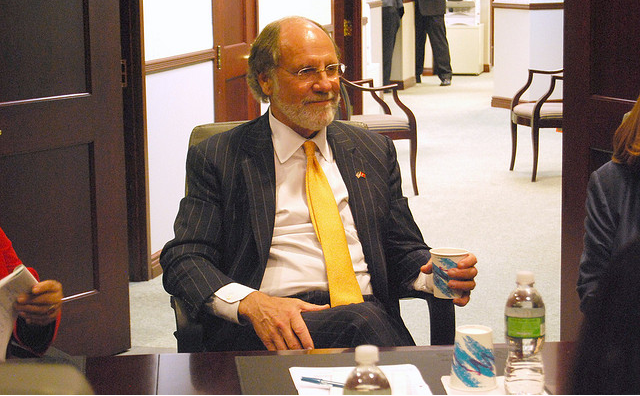
Photo credit: Flickr
Court documents released today by the CFTC declare Jon Corzine guilty in 2011′s MF Global scandal.
It’s been a while since the scandal occurred, so here’s a quick recap: After Jon Corzine left his role as governor of New Jersey in 2010 he went to work as CEO of MF Global, a broker and bond company. A little over a year later, in October 2011, MF Global saw their credit rating downgraded, and shortly thereafter the company went bankrupt, making it one of the 10 biggest bankruptcies in US history.
There was a bigger problem than just the bankruptcy, though. It also turned out that over $1 billion of customers’ money was missing.
When questioned about the money back in 2011 Corzine said that he had no idea where it was, and that was “stunned” to discover that it was missing.
However, the report released today shows that Corzine knew what was going on.
Leading up to MF Global’s bankruptcy. Corzine had essentially been making huge bets with the company’s money. He dreamed of making MF Global into a major investment bank. According to the report, the company’s Chief Risk Officer (CRO) balked when he first saw what Corzine was trying to do, claiming that the bets were far too risky for the company’s long-term health. So Corzine had the CRO replaced with someone who agreed with his reckless strategy.
In May 2011, auditors for MF Global found that the company had used customer funds for investments that weren’t legally permitted. MF Global received what was essentially a warning, but Corzine didn’t fully listen. By October 2011, when the positions MF Global didn’t turn out as well as they’d hoped, Corzine told an employee in their treasury department that they needed to get more funds, even if meant “going negative” with customer accounts.
When Corzine told another employee about his plans, the employee said it was “unsustainable” and that “the situation is grave.” In another conversation at the time, the treasury employee declared, “we have to tell Jon that enough is enough. We need to take the keys away from him.”
Still, Corzine was determined to pull more from these accounts, going so far as to openly declare that he wanted to push limits on what was legal for him to use: “We need to go through what that real number is,” he said. “You know, what’s the drop dead amount. . . . You know, I’m sure there is a buffer . . . We’ve got to find out what that is so that we have some ability to think about pulling it if we have to. Obviously, keep me posted.”
When things continued to go downhill, the main employee who’d been shifting all the money around for Corzine said in a recorded phone call to another employee that “it is a total clusterf*** . . . . They have to move half a billion dollars … I need the money back from the broker-dealer I already gave them.”
It only got worse from there. As Corzine realized the full weight of what was happening he openly called for employees to shift customer money (which was in segregated accounts, or “seg” for shorthand). Here’s an excerpt of the conversation:
Corzine: We have a money management account at Chase, if my memory serves me.
Employee #1: Yeah, it’s the JP Morgan Trust account, but that’s cash seg for clients—it has nothing to do with greasing our wheels for Chase to move.
Corzine: I understand but you put it in a tri-party, and then once the securities have started moving, then you move it back to the, um—this is the same thing we did last night, they left it in the tri-party, the seg money.
In other words, Corzine wanted to do something illegal, but just quickly so no one would notice. Just move it, and then move it right back—no problem, right?
Except it was then that MF Global went bankrupt, and the customers couldn’t access their investment money.
So what now? Well, now we know for sure that Corzine was directly involved in losing customer money. As a result, the ruling declares that MF Global must settle all charges against company, pay a $100 million penalty, and pay all the funds still owed to commodity customers. That is, Corzine is just getting fined.
We’ll have to look deeper into the full legal case here, but upon a first reading of the CFTC report, it sure seems to us that Corzine (or, more accurately, MF Global) deserves more than just a fine. We think Corzine deserves jail time for his offense.
What do you think?





Corzine, along with all the other Goldman Sachs criminals, deserves to rot in prison. End of.
Obviously, if you have the right connections there ain’t no such thing as “illegal”.
It isn’t just the money markets where this is a problem. There are private companies who work with the NSA. CIA, etc. who are doing “black hat hacking” for profit. They do attacks against computers all over the world in ways that are explicitly illegal and nobody can touch ‘em. The worst is an outfit called “Endgame” in Atlanta GA:
https://docs.google.com/file/d/0B6Fh3F6hufhDMGVjMUgxdXEwMzg/edit
The rule of law is over in America. We’re in the final stages of collapse and nobody is paying attention.
Bravo. Well said.
I think you should have the balls to say Democratic governor
You can get 10 years for stealing $30 with a gun, but a slap on the wrist for stealing 1 billion with a pen.
Corzine should be in jail. But good luck with our crooked DOJ Holder